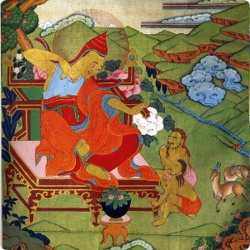Dharmakirti The Philosopher
Dharmakirti (Skt. Dharmakīrti; Tib. ཆོས་ཀྱི་གྲགས་པ་, Chökyi Drakpa; Wyl. chos kyi grags pa) (7th Century) was born to a bramhin family in the South of India. After receiving a bramhanical education, he later became interested in the Buddhist teachings. He then travelled to Nalanda in order to receive teachings from a direct Disciple of Vasubandhu. Dharmapāla was still living—Dharmakirti received ordination from him—but Dignaga had passed away. Instead he received instruction from Ishvarasena, who was Dignaga's direct Disciple. Having entirely comprehended Dignaga's oeuvre, he became perhaps the greatest master of pramana and went on to compose the 'Seven Treatises on Valid Cognition'.
He asserted that inference and direct Perception are the only valid kinds of Knowledge and that, in the processes of the Mind, cognition and the cognized belong to distinct moments. According to him, the object of inference, either analytical or synthetic, is the universal (sāmānyalakṣaṇa) and the object of Perception—which may be perceived by the five senses, by the Mind, by self-Consciousness, or by the practice of Yoga—is the pure particular (svalakṣaṇa).
Dharmakīrti claimed that every person is a transitory being and, in his turn, assumes the continuous existence of an individual. The individual is a continuation of moments, compiled by imaginative and discriminative Thinking.
Writings
The Seven Treatises on Valid Cognition of which
Pramanavarttika is the main.
Quotations
སེམས་ཀྱི་རང་བཞིན་འོད་གསལ་ཏེ། །
དྲི་མ་རྣམས་ནི་གློ་བུར་བ། །
The nature of Mind is clear Light,
Defilements are only adventitious.
Dharmakīrti, Commentary on Valid Cognition, chapter II
བདག་ཡོད་ན་ནི་གཞན་དུ་ཤེས། །
བདག་གཞན་ཆ་ལས་འཛིན་དང་སྡང་། །
འདི་དག་དང་ནི་ཡོངས་འབྲེལ་ལས། །
ཉེས་པ་ཐམས་ཅད་འབྱུང་བར་འགྱུར། །
When there is an “I”, there is a Perception of other,
And from the ideas of self and other come Attachment and aversion,
As a result of getting wrapped up in these,
All possible faults come into being.
Dharmakīrti, Commentary on Valid Cognition, chapter II
དོན་དམ་དོན་བྱེད་ནུས་པ་གང༌། །
དེ་འདིར་དོན་དམ་ཡོད་པ་ཡིན། །
གཞན་ནི་ཀུན་རྫོབ་ཡོད་པ་སྟེ། །
That which can ultimately perform a function
Is here said to be ultimately existent.
All else besides has relative existence.
Dharmakīrti, Commentary on Valid Cognition, chapter III, 3
Dharmakirti (7th centrury) is one of the most important Buddhist philosophers. Born as a South Indian Brahmin, he studied with Dharmapala at Nalanda University where he became a teacher and was one of the Buddhist founders of Indian philosophicallogic. His writings treat basic questions concerning the nature of Knowledge, its forms, and its relation to the external World. He profoundly influenced Mahayana Buddhism and South Asian philosophy as a whole. Dharmakirti was one of the principle spokesmen of the Yogachara (Skt.), Chittamatra (Tib.) or Mind Only school of Indian Buddhist Philosophy, which greatly influenced Tibetan Buddhism, especially the Nyingma school and the highest teachings in Tibetan Buddhism—Dzogchen. His “Seven Treatises on Valid Cognition,” often cited in teachings by His Holiness the Dalai Lama, are a basic part of the monastic curriculum even today.
